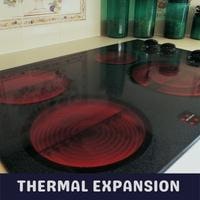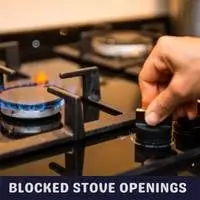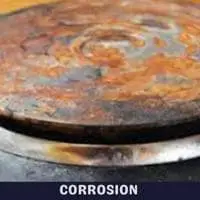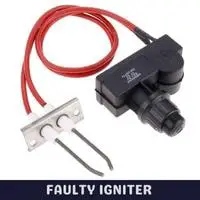Electric stove making clicking noise. If there is clicking on the electric stove, the stove is trying to heat the burner or something it’s failing.
An internal electrical malfunction may be causing the clicking, and the settings inside may change. The oven may be moving from one element to another, causing noise because of the cycle.
I had my electric stove clicking and scaring me. My stove was making noises during cycles, and sometimes it clicked but didn’t turn on.
I thought buying a new stove was better, but my friend told me that clicking on the stove can be taken care of. I researched the clicking noises from the stoves and called the stove company.
The company told me about the noises from the stove and the method to stop the clicking. I fixed my stove and didn’t buy a new stove.
Read to learn!
Electric stove making clicking noise
Having an electric stove makes the cooking style easier. The electric stove has the latest electrical technology, far better than gas stoves, but the problems with electric stoves are advanced too.
Electric stoves can have power issues, and the worst is the clicking issue in the electric stoves.
The clicking error is caused because of the shifting of the element during the cycle or technical faults causing the stove to malfunction.
Expansion of stove arts can also cause noises. Burners, when damaged, produce noise. The opening of the burner can be clogged, and the stove makes noise because of clogs.
Electric pulses
Electric stoves work on electricity, so the problem with these stoves is electrical too. Sudden electrical surges in the form of spikes aren’t suitable for electric stoves, as these spikes can overwhelm them.
This overwhelming can cause the stoves to produce the sound. The cracking sound is heard with surges and spikes, and this cracking sound can be dangerous.
The pulses can heat the stove too much, and the metal can get overheated.
This overheating because the pulses can expand the metallic components. This expansion is the reason for the popping and clicking sounds.
The pulse or spikes can be very dangerous for you and the stove. Too much expansion because of the surges can make the electric stove explode.
If you don’t like the explosion of your electric stove, try to smoothen the electric flow. Use circuit breakers not to allow pulses to reach the stove.
Thermal expansion
Metallic components are present on the stove. These metallic components, due to overheating, can expand.
Thermal expansion is a typical expansion process in metals when they are exposed to heat.
The stoves are primarily built in such ways only to get the heat or confine it at the center. Confining the heat to the center is a feature of most stoves but not all stoves.
Some stoves don’t have a center heat confining feature in them. The stoves without center heat confining let heat confine other parts of the stove too.
The old stoves have it worse. The old stoves send more heat than the modern stoves to the other parts. This distribution is because of the wearing and tearing of the stove.
The clicking sound is produced because the heat expands these parts. If there is an expansion of stove parts, then replacing the stove is a better idea.
Overheating can also cause the parts of the stove to expand more than their limits and eventually explode.
The explosion won’t only damage the stove itself, but the stove explosion can be a safety hazard and even burn the whole house. So, replace it.
Blocked stove openings
Openings of the stove can get closed because of dirt and dust. Clogging is very typical in stoves. The clogging is most commonly responsible for the popping sound from the stove.
The clogging can cause scary sounds and even decrease the working capability of the stove.
The sound is produced because the outflow of the fuel is disturbed by the clogging.
The dirt won’t get cleaned on its own, and it will keep making clicking sounds.
To remove the dirt, a small stick is needed. Toothpicks may be suitable as they can clear the openings. YOu can clean the clogs by taking the ring off the stove.
The removed ring can be gently hit on something hard, so the debris gets out because of the shock.
The furl flow will be restored to normal, and the smooth fuel flow won’t make any clicking noises. Cleaning the stove on time is better.
Corrosion
Corrosion, commonly known as rust, is a standard issue with metal objects, especially iron. It’s a hygienic iron issue. The air and water are the cause of corrosion.
When the air makes contact with the water n the metal’s surface, a chemical reaction between the three things takes place and results in rust.
Rust makes clicking sounds because it makes the stove worn out.
Getting rid of air or water will not let the metal corrode as both air and water work to make the metal rust.
Eliminating air as a single factor can work, but it’s impossible as air is needed for us to breathe, but water, on the other hand, is a different story.
Keeping the stove in a place without moisture and water will stop one source, and wiping the electric stove will keep it away from rusting too. No corrosion will stop making rusty clicking sounds.
Delayed ignition
The burners actually cause delayed ignition. Burnes that have some fault in them delay the ignition. The burners can have damage.
The heat because of the building gets delayed, and you get a clicking sound from it.
This ignition delay and heat buildup may not let the burner switch on. Burners refuse to turn on, and the burned cause trouble for us. Bad effeminacy and sound are the results of this.
The ignition delay can be dangerous, and the delay cannot be repaired by yourself. Calling a technician with stove repairing experience is better.
The technician can save you from getting blown by the stove. Turn the stove as you wait for the technician. Stop the stove’s power from behind.
Changing the stove is an option, but a technician finding the problem before purchase is better. Sound will stove if the delay is fixed.
Faulty igniter
Ignitor is another reason for the delayed ignition. The most clicking sounds come because of the ignitor. Faulty or damaged ignitors are the most common reasons.
Ignitors also tear down with time as they are used to ignite the most. The ignitor misbehaves like other stove parts after the ignitor has cooled down.
It is hard to find the ignitor issue as it is deep, and the clicking sound can mislead you to burners and other parts.
Check if the ignitor is giving the sound and replace it. The ignitor should be of good quality, and the ignitor should be from a reputable store.
The quality of the ignitor will determine the life of your stove. The clicking sound will end if the ignitor is replaced with a quality ignitor and the working of the ignitor is smooth. YOu can also get the ignitor from the company.
Leftover fluid
The last clicking sound culprit of the electric stove is leftover fluid. Cleaning the stove diligently requires the use of chemicals that are in liquid form.
The clicking sound after recent cleaning is pretty standard. The leftover fluid is going to cause the noise. You may have cleaned the fluid, but it may not have dried, or you may have used too much fluid on the stove to clean it.
The stove won’t ignite with a tremendous amount of liquid on it. If there is liquid remaining on the stove after you have cleaned it, get a towel and clean the stove by wiping the fluid off.
This will let the stove ignite well. Letting the stove dry on its own is good too. Just leave the stove uncovered and let it dry. The presence of fluids isn’t dangerous as water because of rust. But clean the stove and wipe it.
Conclusion
Having an electric stove making clicking sounds is like an alarm for danger. The clicking sound can be a minor or even major issue. It can develop.
Be careful with electric stoves producing noises. They are hazardous. DIY or call a technician to find the issue. Thanks for reading.
Related Guides





